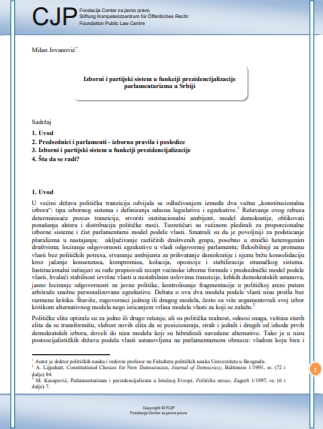Izborni i partijski sistem u funkciji prezidencijalizacije parlamentarizma u Srbiji
Electoral and party system as a factor of presidentialisation of parliamentarism in Serbia
Author(s): Milan N. Jovanović
Subject(s): Politics, Governance, Public Law, Government/Political systems, Electoral systems
Published by: Fondacija Centar za javno pravo
Keywords: election formulas; duration of term of office; possibility of re-election; position of the president in semi-presidential systems; constitution;
Summary/Abstract: This article presents an over-view of the comparative researches that examine how different election formulas, duration of term of office and possibility of re-election reflect on the position of the president in semi-presidential systems. These findings are used as a framework for analyzing the presidential election cycles in Serbia. Our study of the subject shows how direct presidential elections, a fragmented party system, the lack of inter-party democracy, the fusion of the role of head of state and head of party all allow for the president to acquire a great deal of political power despite the lesser role prescribed by the constitution. This means that by controlling his own party, the President can in turn have a great deal of influence on the legislative majority and the cabinet of ministers. As a result the president becomes not only the most powerful element of the executive, but effectively the most powerful institution in the political system. The proposed solutions include redesigning the constitution by either abolishing the direct elections for the head of state and introducing a ban on the president simultaneously acting as chief of party, or a thorough redesign of the semi-presidential model of government by increasing the power of the president.
Series: Fondacija Centar za javno pravo - Projekti
- Page Count: 18
- Publication Year: 2018
- Language: Serbian
- Content File-PDF
- Introduction

